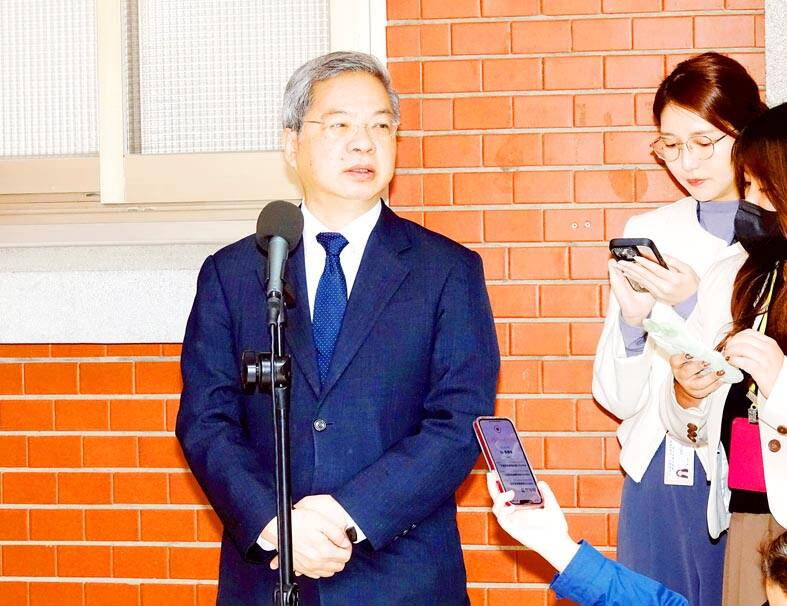Minister of Economic Affairs Kung Ming-hsin (龔明鑫) yesterday said Taiwan’s economy “is not ill,” adding that the development has been strong over the past decade.
Kung made the statement on the sidelines of a legislative meeting in Taipei, in response to The Economist magazine’s cover story last week about what it called the “Formosan flu.”
The country’s outstanding economic performance stemmed from the government’s three investment programs, launched in response to the US-China trade war, which accelerated the return of Taiwanese businesses, Kung said.

Photo: Tien Yu-hua, Taipei Times
Taiwan also secured opportunities in the remote digital business brought about by the COVID-19 pandemic and the artificial intelligence trend, he said, adding that these factors affected the nation’s economy and exchange rates alone do not shape Taiwan’s strong export performance.
The story said the New Taiwan dollar has been undervalued for a long time and warned of hidden risks behind Taiwan’s prosperity.
Exchange rates are determined by the market dynamics of supply and demand, and the NT dollar has remained relatively stable compared with other countries, Kung said.
“It is strange to describe this kind of economy as ill — it should instead be viewed as a model case,” Kung said.
In comparison, China is facing weak domestic demand and is flooding global markets with low-priced products, creating international turmoil and contributing difficulties for Taiwan’s traditional industries, he said.
“The Economist should instead advise them [China] on how to solve the problem — that would be more meaningful,” Kung added.
Separately, Kung yesterday said the alleged intellectual property theft at Taiwan Semiconductor Manufacturing Co (TSMC, 台積電), Kung was unlikely to undermine the nation’s semiconductor industry, the ecosystem of which has remained robust and complete for more than 40 years.
“It is not so simple that one person taking away some data can destroy Taiwan’s semiconductor industry,” Kung said, referring to former TSMC senior vice president Lo Wei-jen (羅唯仁) — who allegedly stole the company’s most advanced process technologies, including 2-nanometer, 16A and 14A technologies before joining Intel Corp last month.
The ministry would assist TSMC should it decide to file a lawsuit against Lo, pursuant to the Trade Secrets Act (營業秘密法), he said, adding that the High Prosecutors’ Office has already launched an investigation under the National Security Act (國家安全法).

JITTERS: Nexperia has a 20 percent market share for chips powering simpler features such as window controls, and changing supply chains could take years European carmakers are looking into ways to scratch components made with parts from China, spooked by deepening geopolitical spats playing out through chipmaker Nexperia BV and Beijing’s export controls on rare earths. To protect operations from trade ructions, several automakers are pushing major suppliers to find permanent alternatives to Chinese semiconductors, people familiar with the matter said. The industry is considering broader changes to its supply chain to adapt to shifting geopolitics, Europe’s main suppliers lobby CLEPA head Matthias Zink said. “We had some indications already — questions like: ‘How can you supply me without this dependency on China?’” Zink, who also

Taiwan Semiconductor Manufacturing Co (TSMC, 台積電) received about NT$147 billion (US$4.71 billion) in subsidies from the US, Japanese, German and Chinese governments over the past two years for its global expansion. Financial data compiled by the world’s largest contract chipmaker showed the company secured NT$4.77 billion in subsidies from the governments in the third quarter, bringing the total for the first three quarters of the year to about NT$71.9 billion. Along with the NT$75.16 billion in financial aid TSMC received last year, the chipmaker obtained NT$147 billion in subsidies in almost two years, the data showed. The subsidies received by its subsidiaries —

At least US$50 million for the freedom of an Emirati sheikh: That is the king’s ransom paid two weeks ago to militants linked to al-Qaeda who are pushing to topple the Malian government and impose Islamic law. Alongside a crippling fuel blockade, the Group for the Support of Islam and Muslims (JNIM) has made kidnapping wealthy foreigners for a ransom a pillar of its strategy of “economic jihad.” Its goal: Oust the junta, which has struggled to contain Mali’s decade-long insurgency since taking power following back-to-back coups in 2020 and 2021, by scaring away investors and paralyzing the west African country’s economy.

RE100 INITIATIVE: Exporters need sufficient supplies of renewable energy to meet their global commitments and remain competitive, the economics ministry said Local export-oriented manufacturers, including Taiwan Semiconductor Manufacturing Co (台積電), require sufficient supplies of green energy to maintain their competitiveness and regulations already ensure that renewable energy development adheres to environmental protection principles, the Ministry of Economic Affairs said yesterday, as the legislature imposed further restrictions on solar panel installations. The opposition-led Legislative Yuan yesterday passed third readings to proposed amendments to three acts — the Environmental Impact Assessment Act (環境影響評估法), the Act for the Development of Tourism (發展觀光條例) and the Geology Act (地質法) — which would largely prohibit the construction of solar panels in some areas. The amendments stipulate that ground-mounted solar